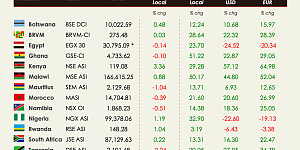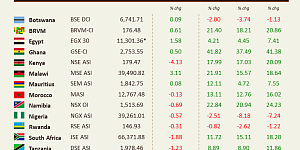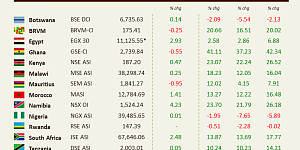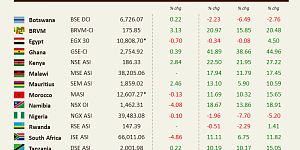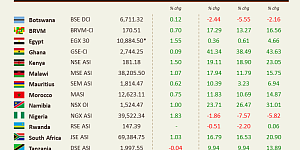African markets portrayed somewhat a rebound this week with 10 out 14 indices under watch ending on green territories. Despite broad economic uncertainties, few positive news translated into major movements of the specific index, highlighting the volatility of the African markets.
EGX 30 rose by 4.79% this week to close at 5,986.78 points, up from 5,713.35 points a week earlier, still well above the support level of 5,526 points. Despite security issues which touched the country following strikes in certain Gouvernats, TUNINDEX increased by 3.15%. The JSE ASI rose by 3.11% this week. The rand advanced 3% after South Africa’s central bank lifted the benchmark rate by half a percentage point to 6.75 percent on Thursday, moving away from a gradual approach of tightening in moves of 25 basis points at a time. This was positively welcome by investors. Further policy easing by Japan also supported the rand. The rand has hugely suffered from commodity pressures and power shortages notably. On top of that, Inflation risks are rising as a strong drought is pumping food prices threatening the central bank’s 3 percent to 6 percent target range.
NGSE ASI slightly made it to the green zone as it rose by 0.38%. The naira fell to a record low of about 306 per dollar this week on the black-market which prompted speculation of devaluation and incited investors to cut holdings of Nigerian assets. Moreover, Nigeria has been hit by long harsh harmattan weather which suffocated coco areas. It is said that the winds may be the strongest in about two decades. The country’s cocoa association believe the 2016 midcrop, which normally accounts for about 30% of Nigeria’s output, may drop by 60%. The Harmattan is also drying out the soil and slowing the development of cocoa pods in Ivory Coast. Nigeria is the world’s largest cocoa producer after Ivory Coast, Ghana and Indonesia. In an attempt to reverse the trends and stimulate the economy, Buhari has proposed stimulating capital spending to 1.8 trillion naira this year to pay for projects such as roads, housing and power plants. With the central bank fighting back the pressure to ease currency controls and devalue the naira, the government chose a fiscal plan as a way to trigger a recovery.
LuSE ASI decreased by 0.84% this week as news broke down that the country has increased power tariffs for mining companies as Africa’s second-biggest copper producer faces its most severe electricity crisis, made worse by a devastating drought. The increase took place on January 1 but the information did not make any official statement.





